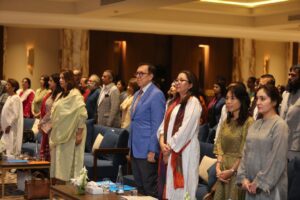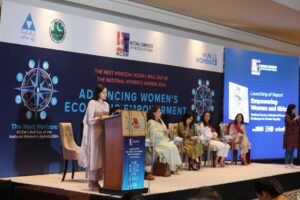UN Women Praises NCSW’s Pakistan Women’s Agenda 2024 as the National Commission on the Status of Women (NCSW) launches a groundbreaking initiative today. This series of participatory dialogues aims to bring together representatives from across Pakistan to deliberate and determine the way forward on key issues related to health, climate change, law, and education. Under the leadership of Chairperson Nilofar Bakhtiar, the commission is spearheading a critical analysis and collaborative solution-seeking process to address issues affecting women in Pakistan.

The national conferences, taking place from 25 to 28 JUNE, 2024, will feature dedicated sessions and group deliberations on health, climate change, law reforms, and education. These themes align closely with the UN Sustainable Development Goals (SDGs), particularly SDG 5 on Gender Equality, as well as goals related to health, education, and climate action.
Global Alignment and UN Women’s Recognition
This initiative aligns with global efforts to advance women’s rights and gender equality. It comes at a crucial time, preceding the 30th Anniversary of the Fourth World Conference on Women and the adoption of the 1995 Beijing Declaration and Platform for Action. The upcoming 69th Session, scheduled for March 2025, will review the implementation progress of the Beijing Declaration, to which Pakistan committed in 1996.
UN Women, the United Nations entity dedicated to gender equality and the empowerment of women, has praised this initiative as a significant step towards realizing the goals set out in the Beijing Declaration. The organization emphasizes the importance of such national-level actions in contributing to global progress on women’s rights.
International Partnerships
In partnership with international organizations such as UNFPA, UNICEF, and the British Council, the NCSW is ensuring that global best practices and international perspectives are integrated into the dialogue. This approach not only strengthens Pakistan’s efforts but also positions the country as a contributor to the global discourse on women’s rights.
Chairperson Bakhtiar emphasizes the international significance of these conferences, stating, “Our efforts here in Pakistan are part of a broader global movement. By addressing these critical issues, we are not only improving the lives of Pakistani women but also contributing to the worldwide advancement of women’s rights.”
The outcomes of these dialogues are expected to have far-reaching implications. They will not only shape Pakistan’s approach to women’s rights and gender equality but also provide valuable insights for other countries facing similar challenges. The actionable plans developed during these sessions will offer a roadmap for policymakers, civil society organizations, and other stakeholders working to improve the lives of women and girls in Pakistan and beyond.
UN Women has expressed particular interest in Pakistan’s approach to addressing climate change’s impact on women, noting that this is an emerging area of concern globally. The organization hopes that innovative solutions developed in Pakistan could serve as models for other countries grappling with similar issues.
The focus on health in these dialogues is crucial, given the persistent challenges in maternal health and access to healthcare services for women in Pakistan. Discussions are expected to cover topics such as improving maternal mortality rates, enhancing access to reproductive health services, and addressing nutritional issues affecting women and girls. 
In the realm of education, the conferences aim to tackle the gender disparity in literacy rates and school enrollment. Strategies to increase girls’ participation in education, particularly in rural areas, and to promote women’s access to higher education and vocational training will be key points of discussion.
The law reform sessions are anticipated to address critical issues such as domestic violence, inheritance rights, and workplace discrimination. These discussions will likely focus on strengthening existing laws and their implementation, as well as identifying gaps in the legal framework that need to be addressed to better protect women’s rights.
Climate change, an increasingly pressing global issue, has disproportionate effects on women, especially in developing countries. The NCSW’s focus on this area demonstrates Pakistan’s recognition of the intersectionality of gender and environmental issues. Discussions may cover topics such as involving women in climate change mitigation and adaptation strategies, and addressing the specific vulnerabilities women face due to environmental degradation.
Global Alignment and UN Women’s Recognition
The participatory nature of these dialogues is a significant aspect of the initiative. By bringing together diverse stakeholders, including government representatives, civil society organizations, academics, and international partners, the NCSW is fostering a collaborative approach to problem-solving. This inclusive strategy is designed to ensure that the resulting action plans are comprehensive, practical, and reflective of the diverse needs of women across Pakistan.
Moreover, these conferences serve as a platform for knowledge sharing and best practice exchange. Participants will have the opportunity to learn from successful initiatives implemented in different parts of the country and adapt these strategies to their local contexts. This cross-pollination of ideas is expected to lead to innovative solutions and more effective policy recommendations.
Media’s Role
The media’s role in supporting these initiatives cannot be overstated. By providing coverage of the conferences and subsequent action plans, journalists can help raise public awareness about women’s issues and mobilize support for gender equality initiatives. This media engagement is crucial for creating the societal momentum necessary to implement the proposed changes effectively.














